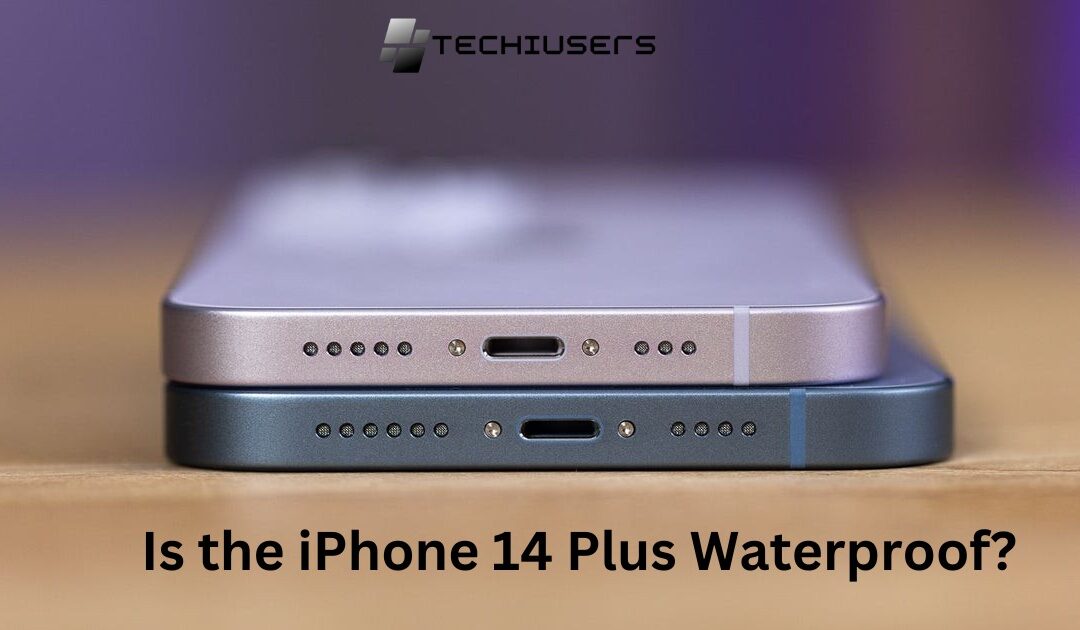You may be wondering about the waterproof capabilities of your iPhone 14. Accidents can happen, and ensuring the protection of your investment is essential.
In this blog post, I will explore everything you need to know about the waterproof features of the iPhone model you own.
From its IP rating to real-life tests and practical tips, I’ll help you determine whether you can confidently take your iPhone underwater or if extra precautions are necessary.
So, grab your towel and let’s dive into this informative guide!
Are the iPhone 14 and 14 Plus waterproof?
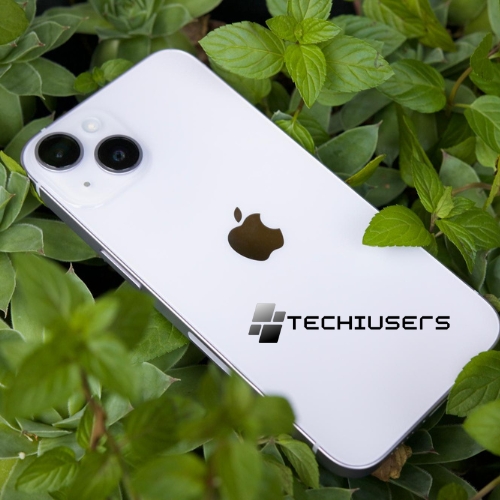
The iPhone 14 and 14 Plus are indeed waterproof to a significant extent. Their IP68 rating assures remarkable protection against dust particles and liquids.
The ‘6‘ in their IP rating indicates complete resistance to dust and tiny particles, ensuring your phone remains safe even in dusty environments.
Moreover, the ‘8‘ in IP68 signifies these phones can withstand immersion in fresh water for about 30 minutes at a depth of around 19 feet (6 meters).
This means you can confidently use your iPhone 14 or 14 Plus without fretting about dirt and even rinse it off with water if it gets dirty, all while having peace of mind about accidental water exposure.
Are the iPhone 14 Pro and 14 Pro Max waterproof?
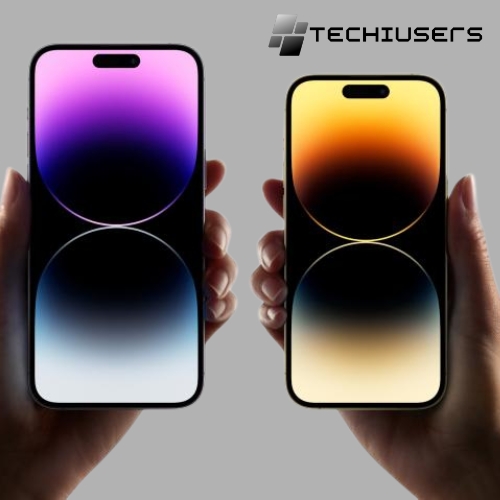
The iPhone 14 Pro and 14 Pro Max boast an IP68 rating, showcasing their resistance to dust and water.
Similar to the base iPhone 14 models, this rating ensures these Pro variants can endure submersion in fresh water for up to 30 minutes at a depth of around 19 feet (6 meters).
However, it’s essential to recognize that while they’re tested and certified as dust-tight, real-world conditions might differ.
For instance, if your phone’s display has any cracks or damage, there’s an increased risk of potential internal harm from foreign particles compared to a device in perfect condition.
Nonetheless, IP68 has become a standard for top smartphone manufacturers’ flagships, with Apple consistently maintaining this rating from the iPhone 11 onwards, assuring a robust level of protection against dust and water for their users.
Is the iPhone 14 Plus water-resistant?
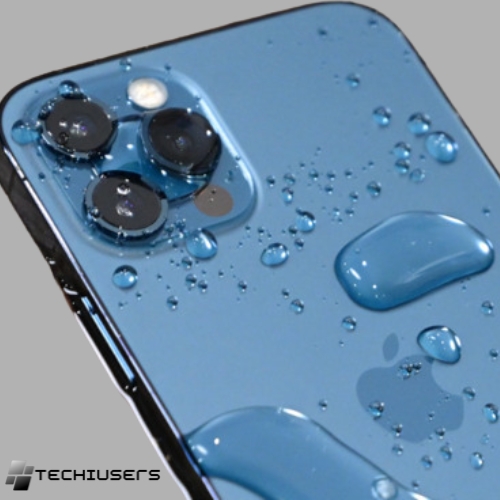
The iPhone 14 Plus is built to resist water. It’s got this rating called “IP68,” which basically means it’s great at keeping dust out and can survive being underwater for about 30 minutes at a depth of 6 meters.
So, if your phone accidentally takes a dive into a puddle, a shallow pool, or gets soaked in the rain, it’ll come out okay, no worries!
If you’re interested in learning more about the water resistance capabilities of other iPhone models, be sure to check out my articles on the [iPhone 11 series/iPhone 12 series/iPhone 13 series/iPhone 15 series]. I’ve covered everything in detail.
How to Make Your iPhone 14 Waterproof?
Here are some tips for making your iPhone 14 waterproof:
- Use a waterproof case. There are lots of rugged, waterproof cases designed specifically for iPhones that will protect it from water damage. Make sure to get one designed for your iPhone 14 model.
- Apply a waterproofing spray. There are sprays you can apply that coat the iPhone and make it water-repellent. Just spray it on, let it dry, and reapply every few months. Popular brands are Liquipel and HzO.
- Use a waterproofing sticker. Waterproof stickers are applied directly onto the iPhone body and ports to seal out moisture. They are inexpensive but can affect iPhone functionality. Xtremeguards and Ghost Armor make waterproof stickers.
- Seal the ports and openings. Use waterproof tape to cover the Lightning port, headphone jack, speaker, and any other openings from water getting in. Make sure the tape is tightly adhered.
- Use a ziplock bag. In a pinch, putting the iPhone in a sealed ziplock bag will give basic water protection. Make sure to squeeze out excess air.
- Avoid submerging it. While these methods can protect against minor splashes or drops in water, they cannot guarantee the iPhone is fully waterproof for underwater use or submersion. Take care to avoid those situations.
The only way to fully waterproof an iPhone is to use a case specifically designed for underwater use. Be aware that any DIY waterproofing methods may still allow water damage and void the warranty.
What To Do If the iPhone 14 Gets Wet?
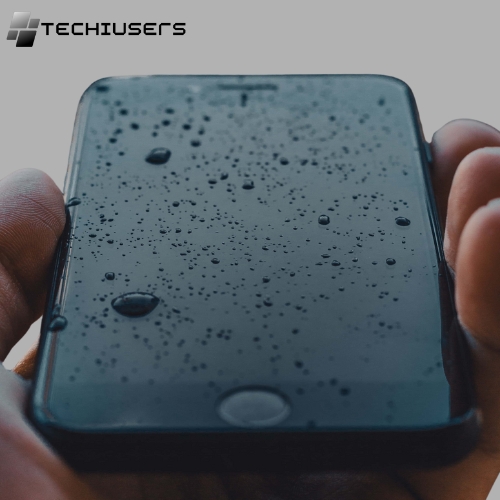
If your iPhone 14 accidentally gets wet, quick action can help prevent damage.
Here’s what you should do:
- Take it out of water: Remove your iPhone from the water as soon as possible.
- Turn it off: Power off your iPhone and remove any case if there’s one on it.
- Dry it gently: Use a soft cloth to carefully dry the outside of your iPhone. If it falls in salt water, rinse it with fresh water to remove salt. Dry all openings like the charging port. Also, dry the case if you have one.
- Avoid using or charging: Don’t try to charge your phone or press any buttons.
- Let it air dry: Place your iPhone in a dry, well-ventilated spot. Avoid using things like hair dryers to dry it faster. Let it dry naturally for about 48 hours before attempting to charge it.
- Check if it works: After the waiting period, turn on your iPhone and try charging it to see if it’s working.
If your iPhone acts strangely or doesn’t turn on after these steps, contact Apple Support right away for repair options. Acting quickly and following these steps can increase the chances of your iPhone recovering from water exposure.
How can I protect my iPhone from water damage?
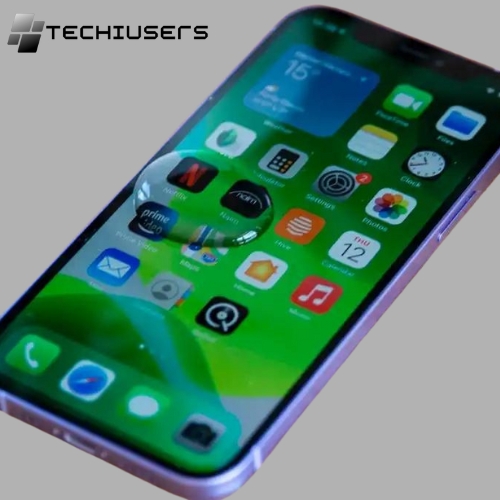
Protecting your iPhone from water damage is important to make it last longer.
To keep it safe:
- Avoid taking it swimming, bathing, or doing water sports like jet-skiing.
- Don’t use it when it’s raining or in saunas.
- Steer clear of taking underwater photos with your iPhone.
- Keep it away from liquids, oils, or detergents like perfumes, lotions, or hair dye.
- Putting a sturdy case on your iPhone can add more protection, especially if you’re prone to accidents.
Following these steps can help keep your iPhone safe from water damage and ensure it stays in good shape for a longer time.
Will Apple repair devices with signs of ‘liquid contact’?
Apple doesn’t cover liquid damage under its standard warranty.
So, if you think your iPhone might get soaked more than the IP68 rating allows, it’s best to keep it away from water.
However, if you have AppleCare+—which you can buy separately when you get your iPhone for a monthly fee—you’re in luck.
With AppleCare+, you get two chances per year for accidental damage repairs or replacements, which should include water damage.
This means you could take your phone to an Apple store and possibly get a replacement for a set fee.
FAQ’s:
Is the iPhone 14 Waterproof or Water Resistant?
The iPhone 14 series, including the iPhone 14, 14 Plus, 14 Pro, and 14 Pro Max, are designed to be water-resistant, not waterproof.
They have an IP68 rating according to Apple, which means they can withstand being submerged in up to 6 meters of water and are also resistant to splashes and dust.
However, it’s crucial to note that despite this level of protection, intentionally submerging your iPhone in water is not recommended.
Over time, daily use can weaken its water resistance, and it’s important to remember that water damage is typically not covered by warranty.
So, while the iPhone 14 is water-resistant, it’s best to avoid unnecessary exposure to water to keep your phone safe.
Which iPhone is fully waterproof?
No iPhone model is fully waterproof. Recent iPhones, including the new iPhone 15 models and 14 series, are designed to be water-resistant.
However, it’s essential to understand that water resistance ratings are not permanent and can degrade over time.
Can I Take my iPhone 14 in the Shower?
The iPhone 14 is made to handle accidental splashes or spills thanks to its water-resistant design and IP68 rating, which can handle brief exposure to water.
However, deliberately taking it into the shower isn’t recommended by Apple.
Factors like water temperature, pressure, and moisture buildup in the phone’s openings over time might affect your phone’s performance, despite its good water resistance.
So, while the iPhone 14 is designed to resist water, it’s better to avoid exposing it to excessive water or moisture, especially during activities like showering, to keep it in top shape.
Is the iPhone 14 Safe To Use Underwater?
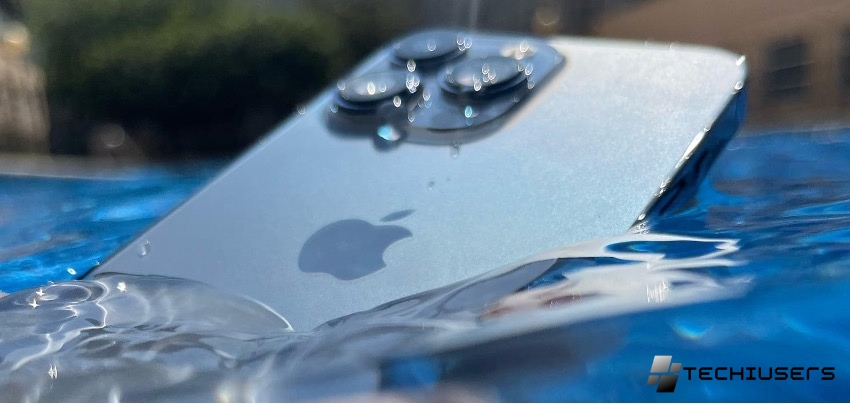
The iPhone 14, with its IP68 rating, can handle being underwater for a short while, but using it deliberately in water isn’t recommended.
While it might be okay for quick dips or accidental drops in freshwater, like a pool, it’s better to steer clear of saltwater in oceans or lakes, as it can damage the phone’s insides.
Additionally, prolonged water exposure, even though it’s designed to resist it, can wear down its water-resistant features over time, potentially causing problems.
So, while it can withstand a bit of water, intentionally using it underwater might not be the best idea for the phone’s long-term health.
Activities You Shouldn’t Do With Your iPhone
Your iPhone 14 is built to handle accidental water exposure like spills or brief submersion in shallow water.
However, there are specific activities it’s better to avoid with your phone to prevent potential damage:
- Scuba diving or deep snorkeling: Depths beyond 6 meters might harm your phone due to pressure, and salty ocean water can corrode it over time.
- Pools with chlorine: Chlorine in pools might not be good for your phone’s health with prolonged exposure.
- Hot tubs and saunas: The heat and humidity can affect the phone’s internal components.
- Activities with extreme water pressure: Jet skiing or water skiing can expose your phone to too much water force, risking damage.
- Turbulent water: Being under waterfalls or strong water pressure might harm your phone, even with protective cases.
- Continuous water exposure: Repeated water exposure can weaken your phone’s water resistance over time.
- Chemicals or non-water liquids: Some chemicals or liquids could corrode or damage your phone’s parts. It’s best to avoid exposure to solvents, detergents, or soaps.
To keep your iPhone 14 safe and functioning well, it’s wise to steer clear of these activities that could potentially harm its performance and longevity.
Is the iPhone 14 resistant to salt water?
The iPhone 14 is okay with fresh water according to its IP68 rating, but it’s not so clear about other liquids.
People often wonder if it can handle salt water. Fresh water won’t harm your iPhone 14 as mentioned before, but salt water can seriously damage it.
So, if you’re around salt water, like in a pool or at the beach, it’s smart to make sure your phone stays dry to keep it safe.
How can I make my iPhone 14 more water-resistant?
If you want extra protection against water, you can get a special waterproof case for your iPhone 14.
But, keep in mind, even with a waterproof case, if it gets damaged or isn’t secure, water might still get inside and harm your phone.
Can I test my iPhone’s water resistance?
Some apps say they can test how well your phone resists water, but it’s unclear how accurate they are.
It’s not a good idea to purposefully put your iPhone 14 in water to check if it’s waterproof.
It’s better to trust the official IP68 rating and just be careful to safeguard your device from water by taking necessary precautions.
Conclusion
The iPhone 14 Plus is not waterproof, but it is water-resistant.
This means that it can withstand splashes and brief immersion in water, but it is not designed to be fully submerged for extended periods of time.
To make your iPhone 14 Plus more waterproof, you can use a waterproof case or pouch.
If your iPhone 14 Plus does get wet, it’s important to act quickly and follow the proper steps to prevent further damage.
Apple does not cover liquid damage under their warranty, so it’s essential to take precautions to protect your device.
It’s also important to note that while the iPhone 14 Plus is water-resistant, it is not resistant to saltwater, so it’s best to avoid exposing it to saltwater environments.
I hope i was able to help you in knowing is the iPhone 14 waterproof. If you’re curious to know about features on iOS feel free to check out the other blogs on my website.

